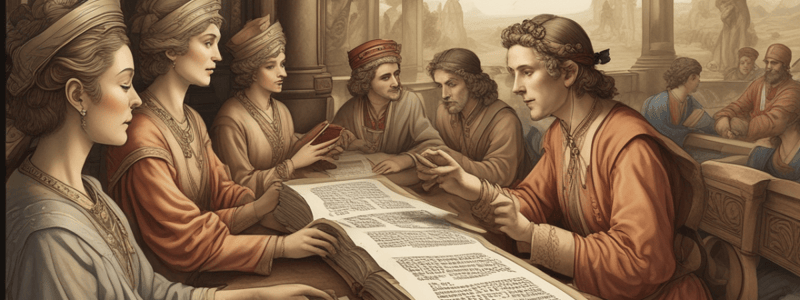Podcast
Questions and Answers
What was the primary aim of Roger Ascham's 'The Schoolmaster'?
What was the primary aim of Roger Ascham's 'The Schoolmaster'?
- To determine a standardized curriculum for all schools.
- To advocate for the advancement of technology in education.
- To promote the memorization of classical texts exclusively.
- To provide guidelines for teachers and insights into effective education. (correct)
Which concept is NOT associated with Ascham's views on education?
Which concept is NOT associated with Ascham's views on education?
- Humanist Education
- Moral Development
- Standardized Testing (correct)
- Role of the Teacher
What pedagogical technique does Ascham emphasize in his educational approach?
What pedagogical technique does Ascham emphasize in his educational approach?
- Use of rote learning methods.
- Focus on competitive assessment.
- Strict discipline and order.
- Dialogue and discussion. (correct)
In what year was 'The Schoolmaster' published?
In what year was 'The Schoolmaster' published?
How does Ascham believe teachers should relate to their students?
How does Ascham believe teachers should relate to their students?
What impact did 'The Schoolmaster' have on educational practices?
What impact did 'The Schoolmaster' have on educational practices?
Which aspect of education does Ascham prioritize alongside intellectual growth?
Which aspect of education does Ascham prioritize alongside intellectual growth?
Who was the primary audience for 'The Schoolmaster'?
Who was the primary audience for 'The Schoolmaster'?
What type of education does Ascham refer to as 'Humanist Education'?
What type of education does Ascham refer to as 'Humanist Education'?
Flashcards are hidden until you start studying
Study Notes
Roger Ascham and "The Schoolmaster"
-
Author: Roger Ascham (1515-1568), an English scholar and educator.
-
Publication: "The Schoolmaster" was published posthumously in 1570.
-
Purpose:
- Aimed to provide guidelines for teachers and insights into effective education.
- Advocated for a balanced approach to education combining classical learning with moral instruction.
-
Key Concepts:
- Humanist Education: Promoted the study of classical texts and emphasis on moral character.
- Role of the Teacher: Teachers should be knowledgeable, supportive, and adaptable to students' needs.
- Methods of Instruction:
- Importance of dialogue and discussion.
- Encouraged questioning and critical thinking.
- Moral Development: Education should cultivate virtue and good character alongside intellectual growth.
-
Pedagogical Techniques:
- Use of examples from classical literature to engage students.
- Emphasis on the importance of reading and comprehension.
- Encouragement of practice and application of knowledge.
-
Audience: Primarily aimed at educators, schoolmasters, and those involved in the instruction of youth.
-
Impact:
- Influenced educational practices and theories in England.
- Contributed to the development of educational philosophy in the Renaissance.
-
Legacy: "The Schoolmaster" is regarded as an important text in the history of English education, encapsulating the humanist ideals of the period.
Roger Ascham and "The Schoolmaster"
- Roger Ascham (1515-1568) was an influential English scholar and educator known for his contributions to educational theory.
- "The Schoolmaster" was published in 1570 after Ascham's death, serving as a significant educational text of its time.
- The book aims to guide teachers in effective education practices and emphasizes the integration of classical learning with moral instruction.
Key Concepts
- Humanist Education: Central to Ascham's views, focusing on classical texts and the development of moral character.
- Role of the Teacher: Teachers are depicted as knowledgeable figures who must adapt to the varying needs of their students, providing support and encouragement.
- Methods of Instruction:
- Advocated for dialogue and discussion as primary learning methods.
- Emphasized the importance of questioning and fostering critical thinking in students.
Moral Development
- Education is portrayed as a vehicle for cultivating virtue and character alongside intellectual achievements.
- Pedagogical Techniques:
- Encouraged the use of classical literature to engage students actively.
- Highlighted reading and comprehension as fundamental skills for effective learning.
- Stressed the necessity for students to practice and apply knowledge to reinforce learning.
Audience and Impact
- The text primarily targets educators, schoolmasters, and those engaged in youth instruction, shaping their teaching philosophy and methods.
- The publication had a significant influence on educational practices in England and contributed to the broader development of Renaissance educational philosophy.
Legacy
- "The Schoolmaster" is recognized as a critical work in the history of English education, embodying the humanist ideals prevalent during the Renaissance period.
Studying That Suits You
Use AI to generate personalized quizzes and flashcards to suit your learning preferences.




